2016 Toyota Mirai Tires, Repair & Service
Get Started
Complete Auto Care for Your 2016 Toyota Mirai
-
TIRES FOR YOUR 2016 Toyota Mirai View Tire Info GET TIRE PRICING
-
REPAIR FOR YOUR 2016 Toyota Mirai View Repair Info SCHEDULE REPAIR
-
MAINTENANCE FOR YOUR 2016 Toyota Mirai View Maintenance Info SCHEDULE MAINTENANCE
-
OFFERS FOR YOUR 2016 Toyota Mirai Limited Time Tire Offers VIEW ALL COUPONS
2016 Toyota Mirai Tires
Recommended Tires | Tire Information
2016 Toyota Mirai Tires Sizes, Speed Ratings, and Inflation
Not sure about your 2016 Toyota Mirai tire size? Use the following chart to find information on tire size, speed rating, and inflation.
| Trim Level | Speed Rating | Inflation in PSI F/R | Tire Size |
|---|---|---|---|
| 2016 Toyota Mirai Base | V | 36 PSI/36 PSI | P215/55R17 |
|
2016 Toyota Mirai Base Speed Rating: V Inflation F/R: 36 PSI/36 PSI |
* Note: these models have different tire sizes depending on vehicle options.
Recommended Tires for Your 2016 Toyota Mirai
What tires are best for a 2016 Toyota Mirai? Check out the following tire brands and types.
 Blizzak WS90
Blizzak WS90
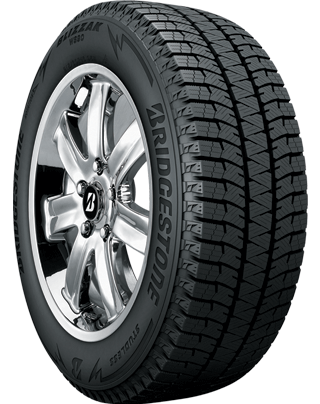
- No warranty
- Winter
- Winter
 DriveGuard Plus
DriveGuard Plus
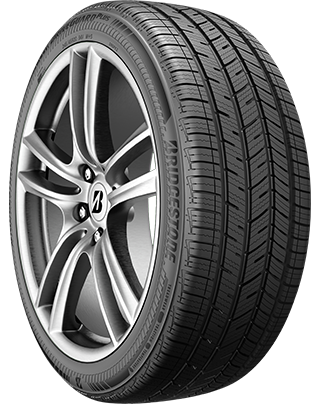
- Platinum Pact Limited Warranty
- All-Season
- Performance
 Ecopia EP422 Plus
Ecopia EP422 Plus
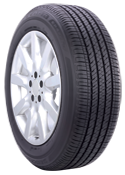
- Platinum Pact Limited Warranty
- All-Season
- Performance
 Potenza Sport AS
Potenza Sport AS
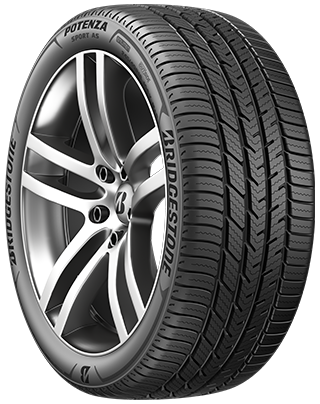
- Platinum Pact Limited Warranty
- All-Season
- Performance
 Turanza LS100
Turanza LS100
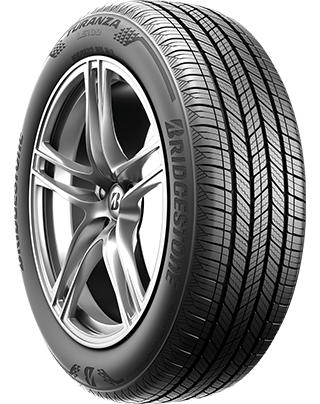
- Platinum Pact Limited Warranty
- All-Season
- Performance
 Turanza QUIETTRACK
Turanza QUIETTRACK
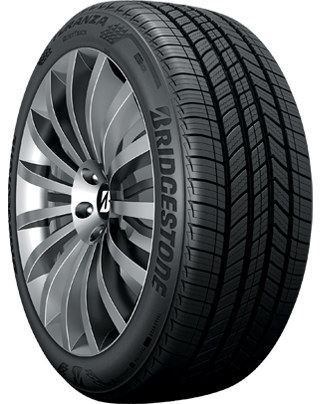
- No warranty
- All-Season
- Performance
 Turanza T005A
Turanza T005A
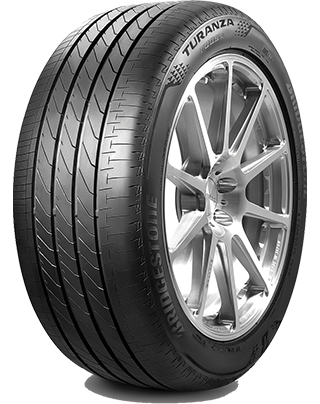
- No warranty
- Summer
- Performance
 WEATHERPEAK
WEATHERPEAK
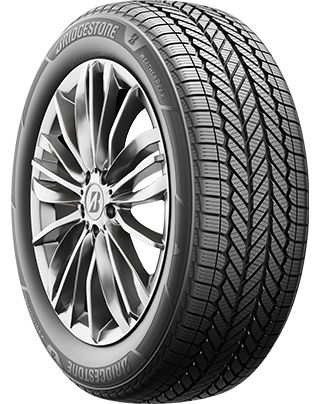
- Platinum Pact Limited Warranty
- All-Season
- Passenger Tires
 ALL SEASON
ALL SEASON

- No warranty
- All-Season
- Passenger Tires
 Firehawk AS V2
Firehawk AS V2
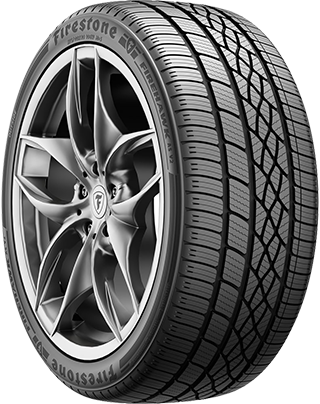
- No warranty
- All-Season
- Performance
 Firehawk Indy 500
Firehawk Indy 500
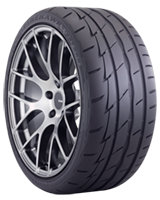
- Gold Pledge Limited Warranty
- Summer
- Performance
 WEATHERGRIP
WEATHERGRIP
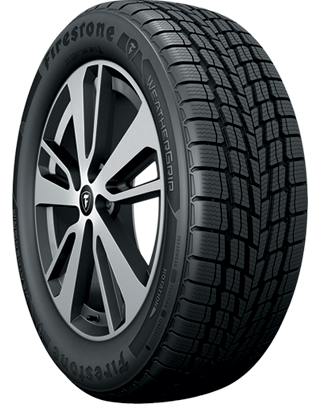
- No warranty
- All-Season
- Passenger Tires
 Winterforce 2
Winterforce 2
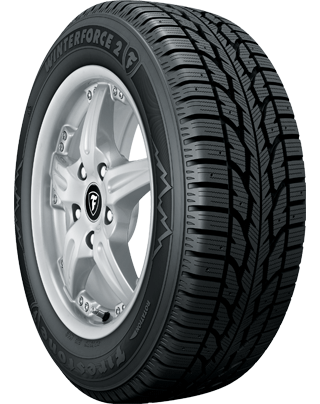
- No warranty
- Winter
- Winter

- No warranty
- All-Season
- Passenger Tires

- No warranty
- All-Season
- Passenger Tires
 Extensa A/S II
Extensa A/S II

- No warranty
- All-Season
- Passenger Tires
Choosing 2016 Toyota Mirai Tires
Beyond the correct tire size, you also want to think about a couple of other things when getting new Toyota Mirai tires like which tire brands you like most and where you drive. When evaluating your driving conditions, think about where you live (countryside vs. city vs. mountains) and the kind of unexpected weather you're likely to experience. Many drivers who live in states that experience all four seasons choose to purchase two sets of tires: one for summer and one for winter. Other drivers prefer to purchase one all-season set to limit trips to the tire shop and make sure their vehicle is prepared in the rain, sleet, snow, or sun!
Your personal driving style is the next factor to consider. If you're an avid off-roader who yearns to pioneer new paths, you have very different tire needs than a highway commuter who doesn't hit the hills very often. Visit your local Firestone Complete Auto Care for help selecting the tire that's right for you, or get started by browsing tires that fit your Toyota Mirai.
Toyota Mirai Installation and More
Firestone Complete Auto Care has been a leading tire provider for more than a century. We're a tire store that also offers professional tire installation, maintenance, and rotation, along with complete auto care. Buy 2016 Toyota Mirai tires online and schedule your installation when it's convenient for you.
Questions About 2016 Toyota Mirai Tires
-
Why check Toyota tire inflation? Even a tiny decrease in tire pressure could impact your safety and fuel economy. Maintaining proper tire pressure can help increase fuel economy, improve braking time, and boost tire lifespan.
-
Why are there numbers on the side of my Toyota Mirai tires? The numbers on your tire sidewall give you information about tire speed rating, traction, treadwear, tire size, and load carrying capacity. Chat with a tire technician to learn how to read the numbers on your Toyota tires!
-
How do I check the tread depth on my Toyota tires? Stay on top of your tire tread depth to help avoid a dangerous drive. You can check tread depth with a penny. Hold the penny so that Abraham Lincoln is facing you, then place your penny into a tread groove upside down. If you can see the top of Abe’s head, your tread is shallow and it might be time for new Toyota Mirai tires. Grab a penny. Hold the so that Abe Lincon's head is facing you and his hair is pointing toward the ground. Then, place the penny into a tread groove. If you can see the top of Abe’s head, your tread is shallow and it might be time for new Toyota Mirai tires.
Repair Services for Your 2016 Toyota Mirai
How do I learn more about auto repairs? Click on a service below to read about the types of Toyota Mirai repairs we do at Firestone Complete Auto Care.
Get Repairs for Your 2016 Toyota Mirai
For most drivers, the words “car repair” don’t exactly spark excitement. But at Firestone Complete Auto Care, we strive to give you the excellent repair experience you deserve. When you come to us for 2016 Toyota Mirai repair services, rest easy knowing that your Mirai is in capable hands. Before we begin any repair work, we’ll diagnose any issues and answer your questions about potential repair options. If a repair isn't necessary, we won't recommend it.
How Much Are Toyota Mirai Repairs?
Several factors can affect the cost to repair your 2016 Toyota Mirai, including which repairs are needed, the cost of any replacement parts, the labor involved, and your locale. But no matter your location, you may be able to save money with one of our many auto repair coupons or offers.
A few different aspects can influence repair costs for your 2016 Toyota Mirai, like
Questions About 2016 Toyota Mirai Auto Repairs
-
Do I need to follow Toyota's maintenance schedule? The cheapest 2016 Toyota Mirai repair is the one that isn’t necessary in the first place! Staying up-to-date with your car’s scheduled maintenance services is a great way to keep future repair costs low.
-
Should I bring my Toyota in even if I can't pinpoint the problem? No, we’re not talking about finding the best jams on the radio! You know your car best, and you’re the first person who will notice if something doesn’t feel right (like new smells, sights, or sounds coming from your car). If you sense that something is 'off,' stop in for a Courtesy Check to have these symptoms checked out ASAP. Early action could help you prevent Toyota Mirai repairs.
-
Why do you recommend certain repairs for my Toyota? Trust is more than just a saying on the wall. It’s a window underneath it. That’s why we won’t recommend services or repairs for your 2016 Toyota Mirai unless we think they’re vital to your safety on the road.
Get Your 2016 Toyota Mirai Brakes Fixed
Your Toyota Mirai engine may be strong and reliable. But if you can’t brake, it might as well be scrap metal. If you’re experiencing squeaky brakes or a loss of braking power, don’t wait! Safe driving and responsive brakes go hand in hand. Plus, ignoring your brake problems can result in more damage and higher brake repair bills. Visit Firestone Complete Auto Care for the right brake repair for your 2016 Toyota Mirai. Our brake repair services include brake pad/shoe removal and replacement, brake rotor/drum resurfacing, brake fluid exchange/bleeding, and wheel cylinder and brake caliper installation.
Answers to Your Mirai Brakes Questions
-
Why does my Mirai shake when I brake? Faulty brake calipers, worn brake pads or rotors, loose or worn suspension parts, and warped rotors can cause your Mirai to shake during braking. If you’re experiencing odd brake behavior, schedule a free brake inspection at a nearby Firestone Complete Auto Care.
-
What is the average lifespan of Mirai brake pads? Brake pads typically last about 30,000 to 40,000 miles. However, driving conditions can affect this range. Sticking to highway driving and braking smoothly can help extend the life of your brake pads, while towing heavy loads or frequently riding your brakes can shorten it.
-
Should my Mirai be leaking brake fluid when the car is off? Because your Mirai brake system is a closed hydraulic system, it should not leak brake fluid. However, if components in your brake system have worn out or been damaged, it might cause brake fluid to leak.
When to Get Toyota Mirai Drivetrain Repairs
Drivetrains for front, rear, and all-wheel-drive and 4WD vehicles are not all the same. You don't want to go to any random shop for drivetrain repair. You want to go to Firestone Complete Auto Care. We can take care of most 2016 Toyota Mirai drivetrain components Your Toyota Mirai may need driveshaft attention if you feel resistance when turning, heavy vibrations in your floorboards, clunks when shifting, or vibration as your vehicle accelerates.
2016 Toyota Mirai Drivetrain Q&A
-
How do I know if my Toyota drivetrain is damaged? Noises toward the back of your Toyota Mirai, leaking fluid, trouble turning — these could all be signs of drivetrain damage you want to address. Take action before something more severe happens.
-
Why is the malfunction indicator light (MIL) on in my Mirai? The malfunction indicator light — also known as the check engine light — on your Mirai can illuminate for a variety of reasons, including engine issues, electrical problems, damaged sensors, transmission problems, misfires, and faulty connections.
-
How concerning is a drivetrain malfunction in my Mirai? If you experience a drivetrain malfunction in your Mirai, it is important to have it inspected by a professional mechanic as soon as possible to identify the underlying cause and perform the necessary repairs. Driving with a malfunctioning drivetrain can be dangerous and cause further damage to your car.
Wheel Alignment for 2016 Toyota Mirai
An alignment involves making adjustments to your Toyota Mirai's suspension system, the connection between the vehicle and the wheels. When your car has an alignment service, your tire angles are adjusted according to measurements recommended by Toyota. Why? So that your tires can make contact with the road at the best possible angle. Bring your 2016 Toyota Mirai in for a wheel alignment and we'll start with an alignment check. After that, we can adjust your wheel alignment angles until they match Toyota’s recommended measurements.
Questions About Toyota Mirai Alignment
-
What can knock my Toyota Mirai out of alignment? Potholes and uneven roads can knock your car out of alignment, so stay aware of the road ahead and adjust your speed (or avoid these obstacles whenever it’s safely possible).
-
How often should you get a wheel alignment for your Mirai? Typically, your alignment should be checked every 6,000 miles or 6 months, whichever comes first. Double-check your Mirai owner’s manual for Toyota's exact recommended schedule.
-
Do you need to get your Mirai wheels aligned when you get new tires? It’s likely not a requirement to get an alignment when you install new tires on your Mirai, but it's a smart idea to do so anyway. An alignment can help ensure even tire wear, smooth handling, and better fuel efficiency.
2016 Toyota Mirai Engine Repair
If your 2016 Mirai engine needs repairs, our technicians will provide you with a thorough explanation beforehand. We never do any work without your sign-off. If a repair can wait, we'll let you know. We'll also tell you if it's necessary for your safety. We seek to give you all the info you need to make a smart decision about our services. Choose Firestone Complete Auto Care for Toyota Mirai engine repairs and you can drive easy knowing that we use Toyota-approved parts and fluids — timing belt, engine oil seal, sensors, or another part.
Engine Q&A 2016 Toyota Mirai
-
Why does my Mirai’s check engine light come on when I start it? It's okay if your check engine light comes on when you first start your vehicle. This is a sign that your vehicle is testing its circuits. The light should go off shortly. Bring your vehicle in if it doesn't.
-
Why is my Toyota Mirai making engine noise? Strange engine sounds can be a sign something’s off in your Toyota Mirai. Knocking or tapping could be a symptom of low oil. A high-pitched whistle could signal an intake leak or misaligned belt. Squealing can be traced back to a loose fan belt, and grinding might be a sign of brake problems rather than engine issues.
-
What could damage my Toyota Mirai engine? Some driving habits are not so great for your engine. These include driving on a near-empty gas tank, flooring the gas pedal while the car is in Park, or accelerating too quickly, too soon. Protect your engine’s performance and efficiency by distancing yourself from these habits.
Tire Repair for Your 2016 Toyota Mirai
If the road has been rough on your 2016 Toyota Mirai tires, Firestone Complete Auto Care can help. There’s a chance your tire could be plugged and patched (rather than replaced). Our technicians can inspect your tire and let you know if it is safe to repair. We'll start by evaluating the state of wear, the location of damage, type of damage, and the size of the damage.
If your 2016 Toyota Mirai tire puncture can be repaired, the repair process is actually fairly simple: (1) Take the tire off the wheel for easy inspection, (2) fill the puncture to keep the moisture out, and (3) secure and seal the inner tire liner to ensure the tire is airtight.
Toyota Mirai Tire Repair Questions
-
How soon should I have my flat tire repaired? Driving on a flat or underinflated tire can put extra stress on your wheels and alignment. While it’s sometimes necessary to drive a short distance on a flat tire to get to a safe place, don’t take any other trips in your Mirai until you can have the flat tire repaired or replaced.
-
Will a temporary sealant fix my Toyota's flat tire? Temporary sealants will solve your problem… for a little bit. If you’ve seen temporary or emergency tire sealant before (it usually comes in a can), it can be tempting to turn to this as a solution for your flat tire. Keep in mind that these fixes could buy you some time to get to Firestone Complete Auto Care for a proper repair, but they could also cause some harm in the process (for example, damage to your TPMS). Plus, using a product like this could void your tire warranty.
-
Why do the tires on my Mirai keep losing air? Your Mirai tires might keep losing air due to a leaking valve stem, puncture or hole in the tire tread or sidewall, or damaged wheel.
Maintenance for Your 2016 Toyota Mirai
You want your Toyota Mirai to last as long as possible. If you put in the effort to keep up with proper maintenance, you could hit 200,000 miles (or beyond!) in your Mirai.
2016 Toyota Mirai Maintenance Schedule
What is the manufacturer recommended maintenance schedule for a 2016 Toyota Mirai? Find maintenance info for your vehicle.
Guide to 2016 Toyota Mirai Scheduled Maintenance
Instead of waiting for an issue to arise with your Mirai, you can stay ahead of problems before they even begin. Rely on the recommended maintenance schedule that’s been created just for your 2016 Toyota Mirai! This recommended maintenance schedule is written by the auto manufacturer, Toyota themselves. Driving conditions, climate variations, and other variables can affect which scheduled maintenance services you’ll need; however, there’s a good chance that your vehicle’s recommended maintenance services will include fluid exchanges, filter changes, new brake pads, oil changes, and tire rotations. Staying on track with routine service appointments can help your Mirai perform better, keep you safer on the road, and help you avoid expensive repairs caused by 2016 Toyota Mirai problems later.
Overview of Essential Toyota Mirai Maintenance Needs
Head to your nearest Firestone Complete Auto Care in your 2016 Toyota Mirai for factory-recommended routine maintenance and an expert technician will begin by performing a Courtesy Check. A Courtesy Check helps "set the stage" for your service and catch any small problems before they turn into big repairs. Each Courtesy Check includes a free battery test and an inspection of your Mirai's windshield wiper blades, head and tail lights, filters, fluid levels, tires, and alignment.
Firestone Complete Auto Care is the place to go for 2016 Toyota Mirai maintenance. We can help you keep your vehicle (and your life!) running smoothly. Many of our locations have weekend and evening hours for your convenience.
2016 Toyota Mirai Maintenance Q&A
-
When should I have Toyota Mirai alignment checked? You know your Toyota Mirai better than anyone else, so you’ll know if something doesn’t feel right while driving. Have your alignment checked (and adjusted if necessary) as soon as you notice a pulling steering wheel to prevent suspension damage or uneven tire wear.
-
When does my Toyota Mirai need high mileage oil? If your Toyota Mirai has ticked past 75,000 miles, consider switching to high mileage oil at your next oil change to give your engine what it needs to go another 75,000 (or more!). High mileage oil: make it a high priority!
-
Can I ignore dashboard lights on my Toyota? Don't ignore dashboard warning lights! Bring your Toyota Mirai in for a diagnostic code scan as soon as a dashboard warning light flashes on, whether it's your check engine or battery light. Dashboard lights alert you to trouble under the hood.
2016 Toyota Mirai Car Batteries
Generally, car batteries last from three to five years. You want to replace your 2016 Toyota Mirai battery before it fails and leaves you stranded. Pay attention to clues that your battery is on its way out. A sluggish engine start, an illuminated check engine light or battery signal, swollen battery case, corroded battery terminals, or weak lights may all indicate that your battery is on its last leg.
Plus, at Firestone Complete Auto Care, we’ll test your battery for free. Visit us for a complimentary battery check and, if necessary, a battery replacement to help keep your 2016 Toyota Mirai running! Car batteries are one of our many specialties! Our technicians are familiar with Toyota-specific recommendations for Mirai car batteries’ reserve capacities and cold cranking amps. Get help figuring out the battery size that matches your vehicle, and schedule a fast car battery replacement at your earliest convenience.
Answers to Your Toyota Mirai Car Battery Questions
-
Why won’t my Toyota Mirai battery hold a charge? A car battery that needs to be jump-started every time is as good as dead. It may be getting old. Or, you’ve been leaving the doors slightly open and the dome lights on during the night. Stop in for a free battery check at your nearest Firestone Complete Auto Care and learn more about your battery's charge.
-
How long can I expect my car battery to last? The typical 12-volt car battery may last three to five years, depending on the type of battery, the driving conditions, and how well the battery is maintained.
-
What is the white, crusty stuff around my Mirai’s battery post? A chemical reaction between battery acid and the air can cause a white, crusty buildup to form on the terminals of your Mirai car battery. This buildup — known as corrosion — can impede the flow of electricity and cause a range of issues, from poor performance to premature battery failure.
Oil Changes for 2016 Toyota Mirai
Your 2016 Mirai’s oil should be changed according to Toyota’s recommended oil change intervals. Your Mirai may need an oil change right away if your check engine/oil change light is on, you hear knock knock knock coming from the engine, sense an oil smell in the cabin, or see an excess amount of vehicle exhaust. You may also need an oil change more frequently than Toyota recommends if you haul heavy loads, frequent dusty roads, go off-roading a lot, or go at low speeds on long distance trips.
Your local Firestone Complete Auto Care has the right 2016 Toyota Mirai motor oil: either synthetic or conventional. Talk with a teammate and consult your owner's manual before picking a motor oil. At Firestone Complete Auto Care, you can choose from the following oils: Quaker State® Advanced Durability™ conventional oil, Pennzoil® High Mileage Vehicle® motor oil, Pennzoil Platinum® Full Synthetic motor oil with PurePlus™ Technology, and Shell Rotella® heavy-duty engine oil. During an oil change, one of our techs will change your Mirai’s oil, replace and recycle your used oil and filter, inspect the rest of your car’s filters, top-off essential fluids, and visually inspect the rest of the vehicle. Get professional engine care by making an oil change appointment for your Mirai today.
2016 Toyota Mirai Oil Change Q&A
-
Why is the oil light on in my Toyota Mirai? The oil change light in your Toyota Mirai could be triggered by an overdue oil change. However, if the oil pressure light is on, you may be dealing with low engine oil, a failing oil pump, a clogged oil filter, or a malfunctioning oil pressure sensor.
-
Can I change my Toyota Mirai oil at home? First off, changing your own oil isn’t as easy as you’d think. You’ll have to buy special tools and figure out a way to recycle the old oil properly. Getting a professional oil change reduces the risk of something going wrong during the service, but also helps your car perform down the road.
-
Why is my Toyota Mirai spewing blue or gray exhaust smoke? There could be an oil leak and your engine is burning oil. Time to have a qualified technician check things out. The leak could be caused by several issues like leaking valve seals, damaged piston rings, or worn cylinder walls.
Engine Tune-Up Service for Your 2016 Toyota Mirai
Routine engine tune-ups can bring power back to your Mirai. Your nearest Firestone Complete Auto Care location has several options to choose from when it comes to Toyota Mirai engine tune-up services. The first is the standard Firestone Tune-Up. This includes the installation of new spark plugs and a visual inspection of your engine’s components, plus a lifetime warranty on parts*. A second service option replaces the air and fuel filter in your Mirai. The third tune-up option is a fuel system cleaning service, which is a three-step process that removes varnish, dirt, and carbon deposits on your Mirai's fuel injectors, throttle body, and throttle plate. This can improve your fuel system’s performance (and therefore, your engine’s performance). Consider this when choosing a tune-up service for your Mirai: your vehicle’s maintenance record and mileage can determine which service is best. Talk to a technician about your driving style, mileage, and service history to learn more about your vehicle's specific needs.
*Check with a teammate at Firestone Complete Auto Care for complete terms and conditions regarding warranties.
2016 Toyota Mirai Engine Tune-Up Q&A
-
Will it hurt my Toyota Mirai to drive with old spark plugs? Replace spark plugs on time or about every 30,000 miles or so. Without the spark of electricity created by spark plugs, your engine doesn’t have the combustion it needs to start — which could leave you stranded on the road. Always replace your spark plugs on time based on Toyota’s recommendations.
-
What does a puddle underneath my Toyota Mirai mean? Puddles could indicate that your vehicle is leaking coolant, oil, or brake fluid. Ignoring these leaks can lead to permanent engine damage, so address these symptoms ASAP with a tune-up service.
-
How often do Toyota Mirai fuel injectors need to be cleaned? There is no hard and fast rule on how often fuel injectors should be cleaned, and it can vary based on driving habits and fuel type. Some manufacturers may suggest including a fuel system cleaning in your regular maintenance schedule. Or you may need to clean your fuel injectors as needed if you notice signs of a fuel system problem.
2016 Toyota Mirai Suspension Service & Repair
When you first drove your 2016 Toyota Mirai, you probably enjoyed a smooth and steady ride. Lately, though, your ride’s been feeling a little bumpy. Perhaps your Mirai feels bouncy, pulls to one side, or makes an unusual noise when going over a speed bump. The first sign of problems is a good time to bring your 2016 Toyota Mirai in for steering and suspension repairs. We'll get to the root of the problem and, if your Mirai suspension system needs repair, we’ll explain what your car needs and how much it’ll cost to get it done. We won't begin any work without your permission.
2016 Mirai Steering & Suspension Q&A
-
What can cause my Toyota Mirai to have a bouncy ride? Excessive bouncing in your Toyota Mirai might be due to damaged struts or shocks that are unable to absorb road bumps effectively, causing your vehicle to feel more like a pogo stick than a smooth ride.
-
Why does my Mirai tilt forward when I hit the brakes? The forward dip in the front end of your Mirai when you brake is caused by the weight and momentum transferring to the front wheels. If your suspension system is in bad shape, it can fail to distribute this force, leading your front end to dip further downward.
-
Does tire pressure and tread depth impact my Toyota's suspension? Maintaining your tires can help reduce strain on the suspension, nd also let you know when it's time to replace your tires. A faltering steering and suspension system could lead to uneven tire wear.
2016 Toyota Mirai A/C Service Near You
Our technicians will work to solve your 2016 Toyota Mirai A/C problems to the best of their ability. During an A/C performance check, we'll determine the condition of your 2016 Toyota Mirai A/C system to determine whether repair work is needed. This check will include an examination of system pressure, a visual inspection, and a leak test.
Let's say we repair your 2016 Toyota Mirai A/C system. We will also perform an A/C evacuation and recharge. To start this process, a technician will flush out the old refrigerant from your vehicle’s A/C system. Next, they will evacuate the system according to Toyota's recommendations. The A/C system is recharged with new refrigerant.
Frequently Asked Questions for 2016 Toyota Mirai A/C Systems
-
Why is my Mirai A/C blowing hot air? Maybe your A/C starts cool but then gets warm. Or maybe it never gets cold in the first place. Either way, your A/C troubles could be traced back to a clogged expansion valve, faulty compressor clutch, blown fuse, or leak.
-
What causes A/C system leaks? To put it simply, age and moisture are some of the main causes of leaks in your A/C. Over time, rubber gaskets and seals can wear out, which pushes much-needed refrigerant out of your Mirai’s A/C system — and lets outside moisture get in, which can take a toll on internal A/C components.
-
Why does my Mirai’s A/C only work when the car is moving? A problem with one or more of your air conditioning or electrical system components could cause the A/C to only work when your Mirai is moving. You may be low on refrigerant, or the cooling fan could be faulty.
2016 Toyota Mirai Transmission Service & Repairs
Your transmission carries power from the engine to the wheels so that you can drive at the speed you desire. Since the transmission has to translate the precise amount of power for your desired amount of speed, a tiny transmission issue can take a major toll on your car’s performance. Toyota Mirai transmission problems can present themselves as shifting delays, grinding or jumping during acceleration, the car shaking on the road, or whistling noises or a burning smell coming from beneath the hood. If you don’t pay attention to Toyota Mirai transmission trouble you could see your fuel economy decrease or find that you can't drive your Mirai at all. Our technicians know how to service your 2016 Mirai up to Toyota-recommended standards. As soon as you suspect something’s wrong with your Mirai’s transmission, book an appointment at your local Firestone Complete Auto Care to help keep your Toyota running for miles and miles.
Questions About 2016 Toyota Mirai’s Transmission
-
How often does my Mirai transmission fluid need to be checked? Caring for your Toyota Mirai’s transmission fluid is a great way to help it perform. About every 30,000 to 60,000 miles is a good timeframe for having your transmission fluid inspected and perhaps changed. Service intervals can vary depending on how you use your Toyota, so check with your technician first. Luckily, leaks and low fluid levels are easy to spot and inexpensive to fix.
-
Can transmission fluid leak from my Toyota Mirai? Over time, transmission fluid can leak from your Toyota Mirai, potentially causing transmission problems. A transmission fluid leak may be caused by a damaged transmission pan, faulty transmission cooler lines, worn-out seals, a cracked transmission housing, or an overfilled transmission.
-
Can I drive my Toyota Mirai with a transmission fluid leak? Driving your Mirai with a transmission fluid leak is highly discouraged. Transmission fluid is vital to the smooth operation of your transmission system, and a leak can put the entire system at risk. A transmission fluid leak may lead to decreased performance, overheating, and possibly even transmission failure.
Vehicle Inspection for 2016 Toyota Mirai
When you bring your vehicle to Firestone Complete Auto Care for any service, we’ll automatically do a multi-point Courtesy Check. First, a technician will pop the hood on your Toyota Mirai and test the battery to see how much charge it has left – and determine if it may fail in the near future. We’ll follow the battery inspection with a visual check of your Toyota Mirai’s windshield wiper blades, lights, filters, hoses, alignment, tires, fluid levels, and belts.
While every visit to your local Firestone Complete Auto Care includes a Courtesy Check, you can also request a Complete Vehicle Inspection for your 2016 Toyota Mirai if you suspect there may be a bigger problem. In addition to a visual check of everything that's included in a Courtesy Check, a Complete Vehicle Inspection also includes an examination (by hand!) of your steering, suspension, brakes, and exhaust system. This inspection is aimed at informing you of any major problems that could need immediate attention in order to prevent further damage.
Depending on where you live, your local Firestone Complete Auto Care may be able to perform state-mandated inspections or safety tests on your vehicle. Inspections are performed on a state-by-state basis and requirements vary.
2016 Toyota Mirai Vehicle Inspection Q and A
-
When does my Toyota Mirai need an inspection? If you’ve noticed something that doesn’t feel quite right in your car lately, a Courtesy Check could give you peace of mind. We can help you get to the bottom of strange engine noises, a jerky steering wheel, or an engine that's hard to start.
-
Help! My 2016 Toyota Mirai failed the state inspection test. Can you get it to pass? Don’t panic! Come in for a complete inspection today and we’ll find (and repair) the root cause before you have your vehicle retested.
-
When is the best time to get a complete vehicle inspection for my Toyota Mirai? The best time to have a complete vehicle inspection done on your Toyota Mirai is when you notice something is off but you can’t locate the issue yourself. Schedule an inspection if you experience any unusual symptoms, such as unfamiliar dashboard indicators, strange engine noises, or steering changes. An inspection can be especially beneficial before a road trip for the simple peace of mind. You can feel confident in your adventure!
Radiator Service & Repair for 2016 Toyota Mirai
Staying on top of routine radiator maintenance for your 2016 Toyota Mirai is crucial to keep your engine in the best possible shape for years to come. To keep your radiator functioning, Toyota recommends replacing your antifreeze or coolant at scheduled intervals but it’s also wise to keep an eye out for signs of a failing radiator. Your radiator could be close to causing an engine breakdown if you notice leaking coolant, overheating, or an illuminated low coolant dashboard light.
When you come to Firestone Complete Auto Care, we’ll begin your radiator repair with an in-depth inspection of the cooling system in your Toyota Mirai. We’ll do a machine-powered coolant exchange on the system, and then we’ll top off or replace the fluids that were removed (like chemicals, lubricants, and sealants). Lastly, we’ll perform a pressure check to look for leaks. If you’re about to lose your cool over a too-hot engine, rest assured that your 2016 Toyota Mirai is in good hands at Firestone Complete Auto Care.
2016 Toyota Mirai Radiator Q&A
-
What does an illuminated coolant temperature light mean for my Toyota? Pay attention to the temperature gauge and lights on your dashboard. If a low coolant warning light comes on or your dashboard temperature gauge keeps rising, it’s likely that your engine is about to overheat (and could leave you stranded on the road). Wait for the engine to cool down, then have your coolant system checked immediately at your nearest Firestone Complete Auto Care.
-
What is causing my Mirai to overheat? One of the main reasons your Toyota Mirai engine might overheat is because you don’t have enough coolant. Other causes include a clogged radiator, a damaged cooling fan, a malfunctioning thermostat, or a faulty water pump.
-
What can cause a Mirai radiator to make boiling or rumbling sounds? Air pockets in your Mirai’s cooling system may cause a rumbling or boiling noise. You could also have a clogged radiator or simply need to replace the radiator cap.